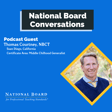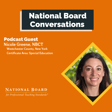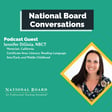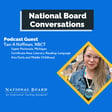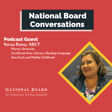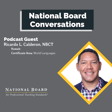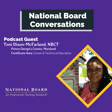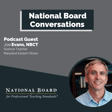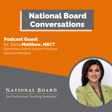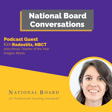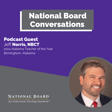Introduction to Episode and Guest
00:00:01
Speaker
Well, we're back everyone. I'm so happy to be sharing another amazing episode of National Board Conversations with you. This is episode six. I have Shareef El-Meki here with me. He's an incredible veteran of the education profession in America. He is an inspiring teacher, motivational figure, and just all around interesting
Empowering People of Color
00:00:20
Speaker
guy. We had a fascinating conversation, focused a lot around equity and inclusion, about empowering people of color and teachers of ethnically diverse backgrounds to really become those pillars
00:00:31
Speaker
for their community, for their students, and to also make a reciprocal experience for their students so that not only is the student learning from the teacher, but the teacher is learning from the student. I was really, really happy to talk to Sharif and I'm so excited to share this episode with you. So without further ado, here is Sharif El-Mekki.
Shareef's Background and Inspiration
00:00:51
Speaker
Hey, Sharif, how are you? Good. Great to be here. How's everything? Oh, good. Good. We're doing great. I'm looking forward to this conversation. So thanks for for joining us. My pleasure. Tell the audience about yourself. Why don't you introduce yourself? Tell us about who you are and just the little kind of logline thesis statement of Sharif. Sure, sure. So my name is Sharif Elmecki. I'm the CEO of the Center for Black Educated Development.
00:01:12
Speaker
I was a teacher and principal for 26 years, all in three schools across West Philadelphia. How did you get into teaching? What made you want to become a teacher? I really think, as I reflect on my early years, several of my teachers, as well as my mother and cousins, who were also educators,
00:01:34
Speaker
You know, I think they planted the seeds young, even though it wasn't explicitly, you know, discussed like, hey, you should consider becoming a teacher. Only person that did that was my martial arts teacher, who was actually my favorite black man, black male educator.
00:01:50
Speaker
I was born to two parents who were activists. They were part of the Black Panther Party. And so we were raised in a household that really supported us in looking at justice, looking at different perspectives and views of what
00:02:07
Speaker
the quality of life could be, what equity and justice could be. I attended an elementary school that was a freedom school that was started by black activists called Netamu Sasa. And I think it really just laid a foundation for me between home and school. I was committed to activism growing up, even though I wasn't sure where exactly that was going
Journey into Teaching
00:02:28
Speaker
to be. I thought I would eventually end up as a lawyer.
00:02:31
Speaker
I think one of the things that I recognized that was really pointed out to me, but was Dr. Martin Ryder, a black man who met with a group of us to consider becoming teachers. He was in partnership with the School District of Philadelphia, where he worked, and an organization called Concerned Black Men. And Chaney University, the first HBCU, historically black college and university, they were creating a partnership to get more black men to teach.
00:02:58
Speaker
And so it was an alternative certification program. I had recently graduated from Indiana University of Pennsylvania in Western Pennsylvania. And you know what? When I went to the meeting, initially I wasn't interested. A friend's mother called me. Mama Cynthia told me about the program. I promised I would go to at least visit, but I was very skeptical about this opportunity and if it was the right fit for me.
00:03:26
Speaker
But going to the meeting, seeing all these brothers there, hearing Dr. Martin Ryder and some other educators, I was intrigued. You know what? This might be what I was looking for my entire life, even though it was a very young life at the time. Now, 27 years later, I am so grateful that Mama Cynthia called and Dr. Martin Ryder and the team that he'd worked with had this opportunity for brothers like
Role of Black Men in Education
00:03:52
Speaker
Why is it important to empower black men to teach? Why was Dr. Martin Reiter out there talking to you about this? Yeah, you know, I think it's always been important for, you know, black men to participate in the education of our children. You know, black men do it informally in so many ways, you know, coaching, mentoring in the barbershop, whispering in the kids ear, encouraging them, you know, all of those spaces that you find black people, you'll find black men and women. But, you know, we're talking about black men right now.
00:04:19
Speaker
who are mentoring, supporting black children and each other. And so I think that often gets lost. The schools become a space where you don't find as many black men, even though that their mentorship, their voice, their guidance, their experiences are so crucial, so important in a children's upbringing.
00:04:39
Speaker
But you often don't find them in schools. You know, they're not encouraged to be in schools when they're in schools. They are often looked at as disciplinarians and not true educators. And so I think it's really important for our students, particularly black boys, to be able to
00:04:56
Speaker
engage and interact with black leaders in schools that are usually overwhelmingly filled and led by white women. And so I think across the United States of America, only 2% of public school teachers are black men. So the lack of diversity overall, and particularly acutely for black men,
00:05:18
Speaker
I think is a disservice to all children, including white children who need to see a diverse group of educators and leaders in their schools. Right. Yeah, so the need for proportionate representation is huge. Have you seen it changing over the
Diversity in Education
00:05:36
Speaker
years? Have you looking back on it or what's your take on that?
00:05:39
Speaker
You know, I think naturally, no, I think it's stuck. I think it'll need a massive intervention. And so I've seen, you know, in Philadelphia, I remember a couple of years ago, the, you know, while about 4% were black men who were teachers in the city, the recent crop of new teachers in 2018, 7% of the new teachers were black men. So they had almost doubled the incoming class, which is, you know, just a positive, you know, trend. And we have to double down and build on
00:06:09
Speaker
build on that. Fortunately, our leadership at Pennsylvania Department of Ed that started with Secretary Pedro Rivera and now Dr. Noe Ortega was the Aspire to Educate program. This Aspire to Educate initiative basically supports diversifying the teacher workforce, improving the teacher workforce, and there's a consortium of IETs
00:06:27
Speaker
nonprofits like himself, teacher certification programs, the school district, all working in unison to try to right the ship to improve educational equity and justice by ensuring a more diverse teacher workforce. So I'm encouraged. This is still a long ways ago. There's not even a moment to celebrate any small wins, but I do think we should give a nod, a handshake, a high five and a hug and then get right back to work.
Fostering Equitable Classrooms
00:06:56
Speaker
What can teachers do to make sure that they are offering an equitable experience to their students? That they make their classroom an open space? That they're mindful of all their students, their communities, and cultures that surround them? What kind of things can teachers be doing? It's hard to know what they may not have thought of, but what I would encourage people to do is, one, have a high level of cultural humility.
00:07:18
Speaker
you know, understanding that you are there as a learner as well and that students have something to teach you, that you don't come in knowing everything about every child, that the best intervention you could have to accelerate student learning is strong relationships with parents, you know, the respect of parents as partners in the work of educating their children.
00:07:38
Speaker
to develop relationships and trust with not only the students but those who sent them to you. Avoiding having a deficit lens about the communities that you're supposed to be serving. Having high expectations for yourself and your students.
00:07:53
Speaker
but not just telling yourself, oh, I have high expectations. I know I do. Ask your students, you know, seek their data, seek their feedback. So even if your school or your district doesn't do parental surveys or student surveys, as an educator, you should do that. You should do an equity audit in your own instruction. You should ask students of colors, how do you experience my classroom? How do you experience being a student? What does that look and feel like?
00:08:19
Speaker
Sometimes I know educators who followed their students' footsteps for a day, literally pretending to be a student and following the class schedule. And unfortunately, several of the ones I spoke to who did this type of equity audit were horrified, mortified about the experiences when sitting in the student's desk and experiencing it with students. That should never happen. And so those are the things that
00:08:44
Speaker
you know, we need to be open about, be humble and courageous about addressing, including if we find it in our own personal practices, right? So when we look in the mirror, we should be honest because sure enough, when we're looking at our students, they'll know if we're not being honest.
Value of Certification for Educators
00:09:00
Speaker
where you gathered here today to talk about national board certification and the pursuit of excellence in the field of education. You yourself don't have the certification, is that correct? No, I don't. Regrettably. I wish I did and I think as a principal, it is something that I would find extremely valuable. I would not only
00:09:26
Speaker
know with certainty that our students would benefit from having just a school full of National Board Certified Teachers, but also just the profession as a whole, both in a micro level within our school, as well as in our school system in the city, state, as well as country. And so I just applaud the work that the National Board team does on a daily, weekly, and yearly basis to
00:09:52
Speaker
elevate the profession to help teachers hone their craft and to push for outcomes, right? Like at the end of the day, working in a school or being a student is all about, you know, achievement, you know, and so we have to define achievement as how the educator, how the teacher is achieving as well as how the student is achieving. So these outcomes are crucial and it is organizations like National Board that are leading the way in this effort.
00:10:21
Speaker
As a principal, you must have had many teachers over the years into the different schools coming to you and telling you that they're considering pursuing the national board certification. What do you have to say to them when they tell you that they're thinking about going through this journey? I think a big part is the supporting and the feedback loop. So the beautiful thing about getting your national board certification is the amount of reflection, the amount of practice,
00:10:46
Speaker
and feedback that you accept. It reminds me of even when I was recruiting teachers to work, hiring new teachers, one of the biggest things besides content knowledge and their mindsets about the communities that we were in was their coachability. Like how did they internalize feedback? How did they synthesize it and use it?
00:11:13
Speaker
how did they view coaching and development, both from internally, from their own agency and self-efficacy, as well as their relationship with experts in the field. The better our teachers are, the better our principals are, the better our student outcomes will be.
00:11:33
Speaker
So within the school setting as a principal, you're definitely recommending this certification to the teachers, the faculty. You know, the beautiful thing about it is not just at my school, you know, anywhere I go, I am really sharing what I believe is one of the best ways to develop
Increasing Diversity and Equity in Certification
00:11:50
Speaker
and it's through the national board certification process. So it's not just within one particular school, it's across our city and as well as nation. It is a crucial aspect of being a constant learner and always looking to grow in our effectiveness. And in terms of equity and inclusion,
00:12:09
Speaker
Do you feel like this process can help with that for a teacher, for their pedagogy, for their practice? Absolutely. Absolutely. And what I'm hoping is that I know there's a really strong and important campaign within national board of professional teaching standards to increase the diversity, to increase the levels of support, to look at certification through an equity lens. And I've looked at the data across each state.
00:12:38
Speaker
And some states are doing better than others. Some states are being very deliberate about, oh, this is how we're going to support more teachers of color to become nationally board certified.
Amplifying Student Voices
00:12:50
Speaker
And so when you look at things such as teacher equity, which students get the most experienced teachers, the most effective teachers, the most veteran teachers, the most nationally board certified teachers.
00:13:02
Speaker
We have to look at that and see which students are getting that, which students are most in need for the highest qualified teacher. Those are things that we have to look deeply at and then mitigate for whatever barriers are there and address them. When Professor Roy says, there's really no such thing as the voiceless, there are only the deliberately silenced or the preferably unheard, that can be directly applied to the students in our schools.
00:13:29
Speaker
And so if we want to get out of this space and recognize that they have a voice, but are we trying to mute it and marginalize it or are we trying to help them amplify it?
00:13:40
Speaker
That's a different mindset. If we view that the solutions are within the minds and experiences of the youth, then we're going to try to tap into that if we're essentially trying to be problem solvers. They're closest to the problems and the solutions. And yes, we're going to educate them, we're going to mentor them, we're going to support them, but we're also going to listen to them. We're also going to tap into what they know.
00:14:07
Speaker
And they'll help us become better because every time you look at a movement, it's been in the hands of the youth. And so we have to look at these opportunities as fleeting if we continue to ignore the youth and don't allow them to share the leadership, share space. And you know what? Sometimes we just got to get out of their way, right?
00:14:36
Speaker
I do think that's right, and I think it's a perfect thought to end on. But truly, we're just scratching the surface on some of these ideas and the subject matter that we were talking about today. So lucky for you, Sharif is a part of another podcast called Eight Black Hands that you can access wherever you get your podcasts, Apple, Google, Spotify, all that. And please check it out, Eight Black Hands. It'll give you a whole lot more to think about, and it's a really amazing podcast. They're up to almost 100 episodes already, so get listening.
Final Thoughts and Podcast Promotion
00:15:05
Speaker
If you'd like to learn more about National Board Certification, please visit the website at nbpts.org. And until next time, my name is Luke Karaid-Amuud signing off. Thank you so much for joining us.



